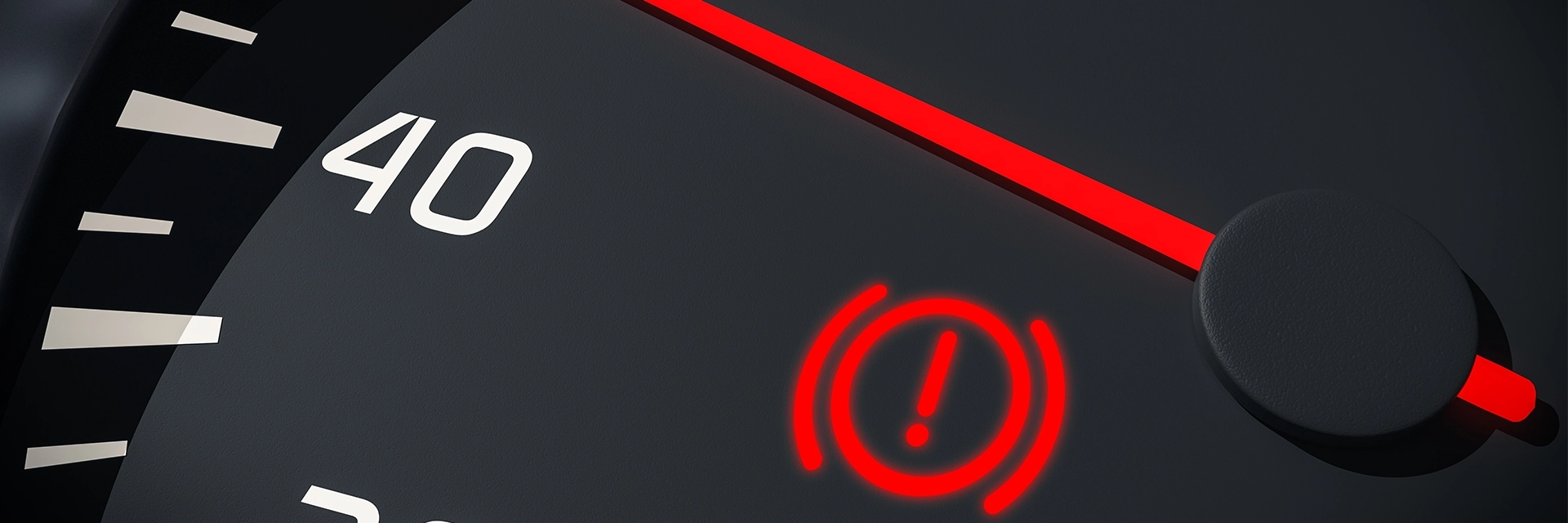Most Common Warning Lights and What They Mean
When a warning light turns on your car’s dashboard, it’s pretty common to feel a sense of confusion, especially if you don’t know what the light means. But while many warning lights aren’t as dangerous as you may think, others are indicators that something is wrong with your vehicle. Warning lights generally pop up when you’re already on the road. This indicates that something has already gone wrong in your vehicle. Understanding the different car warning lights and what they mean can help you maintain your car and keep yourself safe on the road.
Battery Light
The battery light looks like a car’s battery, a long rectangle with a plus side on one end and a minus side on the other. If this light turns on, your vehicle’s charging system isn’t working as it should. It’s not uncommon for this light to pop on immediately after starting your car, but it should go away pretty quickly. If the light persists (or your car won’t start at all), that’s a sign there may be something wrong with your battery, voltage regulator, alternator, or wiring. Many things can contribute to a battery light turning on, including:
- A discharged or weak battery
- Loose battery cables
- Acid corrosion build-on on battery terminals
- A faulty alternator
- A defective battery
At this point, it’s a good idea to have your vehicle inspected by a professional diagnostician to ensure your safety. Your local Bosch Auto Service can help diagnose the issue and remedy the problem.
Tire Pressure Light
It’s important to have proper tire pressure when driving to ensure safety on the road. The tire pressure warning light has an exclamation mark inside of a tire (which looks a bit like a horseshoe with spikes on the bottom). This light turns on when the Tire Pressure Monitoring System registers an over or underinflated tire. Both can cause serious issues on the road, including:
- Premature treadwear
- Loose battery cables
- Acid corrosion build-on on battery terminals
- A faulty alternator
- A defective battery
Operating a vehicle with improperly inflated tires can lead to accidents on the road and further damage to your wheels and braking systems. If you see your tire pressure light turn on, you can manually check your tire’s pressure gauge and increase or decrease the pressure until it reaches your manufacturer's recommended setting. If your tire pressure warning light keeps turning on, there may be a leak in your tire or another issue that’s causing these problems. A technician at your local Bosch Auto Service can help identify and repair the issue.
Anti-Lock Brake System Light
If you see a circle with the letters ABS in the center show up on your dashboard, that means there’s an issue with your anti-lock brake system. The ABS is what helps prevent skidding and is crucial to avoid accidents, especially in icy or wet driving conditions. The anti-lock brake system light commonly turns on when one of the four problems is present:
- ABS module is malfunctioning
- Fluid reservoir levels are low
- Wheel speed sensors are broken
- System is deactivated
If you notice this light, don’t hesitate to visit your local Bosch Auto Service to get the problem fixed. Bosch was the first supplier to launch the anti-lock braking system in 1978 into the automotive industry market, so you can trust your Bosch Auto Service technician to properly handle any ABS problem.
Check Engine Light
The check engine light is probably one of the most misunderstood lights on your dash. The light turning on simply means that there’s something wrong your car’s engine computer is picking up on. It could mean a wide variety of issues, both minor and major. It’s highly important that you don’t ignore the check engine light, as it may indicate a cause for serious concern.
A technician at your local Bosch Auto Service can perform a diagnostic test to see what problem your vehicle is facing. Even if it’s a small issue, it could turn into a greater threat if left untreated. Some of the most common problems that cause a check engine light to turn on include:
- Old or dirty oxygen sensors
- Damaged ignition coils or spark plugs
- Loose or missing fuel cap
- Faulty fuel injectors
The check engine light covers almost every issue that other warning lights don’t. Cars are complex pieces of machinery, and a lot can go wrong. It’s important that you get your engine serviced as soon as possible to avoid any catastrophic failures in your vehicle.
Engine Oil Level Light
This car warning light is probably one of the hardest to identify just from looking at it. The oil can symbol with a drop of oil leaking out means that your car’s engine oil levels are low. Usually this means you’re overdue for an oil change, but it can also indicate:
- A bad oil pump
- A faulty oil pressure sensor
- An oil leak
- Dirty oil
- Low oil levels
You should never ignore a car warning light, even if you think it’s not a big deal. Once a light turns on, you know that something has already gone wrong in your vehicle. Ignoring that light can only lead to more serious issues. Sometimes these lights can also indicate bigger problems that you wouldn’t otherwise notice right away. If you see any indicator light on your dashboard, bring your vehicle to your local Bosch Auto Service for a vehicle diagnostics appointment with multi-point inspection.


